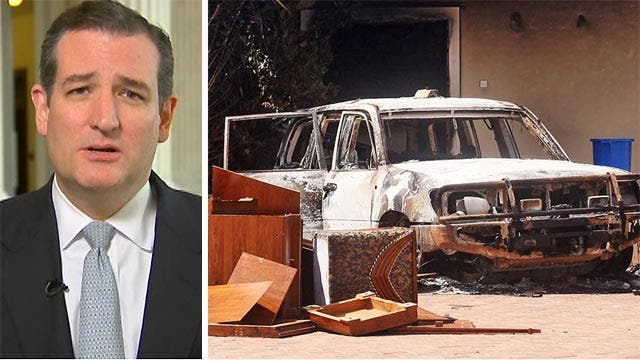Sen. Ted Cruz: Benghazi 'shouldn't be a partisan issue'
Texas Republican calling for a joint select committee to investigate attack
White House officials either failed to comprehend the situation in Benghazi or ignored the dramatically deteriorating security there while preparing for the September 11th anniversary, according to a new report set to be released by the House Armed Services Committee Tuesday.
Some of the biggest concerns yielded from the report center around why the Obama administration chose to allocate security resources in parts of the region and not in others following a series of assessment reviews led by then-Deputy National Security Advisor John Brennan, senior aides familiar with the report told Fox News.
"The report details an example of changes that were made in our foreign posture in response to the perceived threat in Yemen and compares and contrasts that to the situation on the ground in Libya," one senior aide said. "While we identify that discrepancy, we are not fully able to get at why some of those decisions may have been made within the National Security Council or the White House."
The report, which comes on the heels of two separate reports on the Sept. 11, 2012, attack by other congressional committees, seeks to build upon the Interim Progress Report released in April by five House committees investigating the terrorist attack, according to senior committee aides.
The report, aides said, found that U.S. military personnel in Benghazi were vulnerable at the time of the attack because the administration did not direct a change in military force posture, there was no intelligence of a specific “imminent” threat in Libya, and because the State Department, which is primarily responsible for diplomatic security decisions, favored a reduction in Defense Department security personnel in Libya before the attack.
Defense Department officials believed nearly from the onset that it was a terrorist attack and not some sort of a protest gone awry, and that when President Obama was advised of this he gave the military the latitude to respond as they saw appropriate, with minimal direction from the White House, aides said, describing the report.
The report also found that military’s response to the Benghazi attack was severely degraded because of the location and posture of U.S. forces, and because there was some lack of clarity about how the terrorist attack was unfolding. As a result, U.S. military commanders did not take all possible steps to prepare for a more extended operation, committee staffers said.
While the committee's report concluded there was no “stand down” order issued to U.S. military personnel in Tripoli but the findings indicate there was some confusion on this point because the post-attack reviews conducted at various levels didn’t fully investigate the activities of personnel in Tripoli at the time of the attack, aides said.
The Pentagon is reportedly working to correct many deficiencies and weaknesses that were revealed by the Benghazi attack, but the House report concluded that global security situation is continuing to deteriorate as military resources decline.
Fox News' Nick Kalman contributed to this report.













































